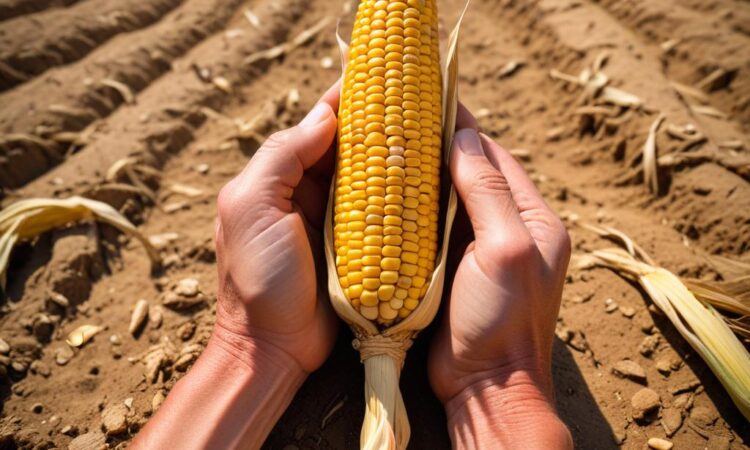The Global Food Crisis: Impacts of Climate Change and Conflict
The world is facing a deepening global food crisis, a complex and multifaceted challenge driven by the interconnected forces of climate change and geopolitical instability. The consequences are devastating, manifesting in rising food insecurity, widespread famine, and the looming threat of mass migration on an unprecedented scale. This crisis demands immediate and comprehensive action, requiring a global collaborative effort to mitigate its effects and prevent further escalation.
Climate Change: A Major Driver of Food Insecurity
Climate change is significantly exacerbating existing vulnerabilities in global food systems. More frequent and intense extreme weather events, such as droughts, floods, and heatwaves, are devastating crops and livestock, reducing yields and disrupting agricultural practices. Changes in rainfall patterns are altering growing seasons, making it increasingly difficult for farmers to predict and adapt to changing conditions. Rising sea levels are inundating coastal farmlands, further diminishing arable land and impacting saltwater intrusion into freshwater sources crucial for irrigation. The effects are particularly acute in developing countries, where agriculture often forms the backbone of the economy and livelihoods.
Beyond direct impacts on crop production, climate change also affects the availability of water resources. Glaciers and snowpack, vital sources of freshwater for irrigation in many regions, are shrinking at an alarming rate. This water scarcity further stresses agricultural production and intensifies competition for dwindling resources, potentially leading to conflict and displacement.
The increased frequency and severity of extreme weather events also disrupt supply chains, hindering the transportation and distribution of food. Damaged infrastructure, disrupted transportation networks, and port closures can lead to shortages and price spikes, further exacerbating food insecurity, particularly in vulnerable populations.
Geopolitical Instability and Conflict: Exacerbating the Crisis
Geopolitical instability and armed conflict further complicate the global food crisis. Wars and conflicts directly disrupt agricultural production by destroying infrastructure, displacing farmers, and hindering access to land and resources. They also disrupt supply chains, limiting access to essential inputs like fertilizers and seeds, and impeding the distribution of food aid to affected populations.
Conflicts can also lead to trade disruptions and sanctions, limiting the availability of food imports and exports. This can create artificial shortages and drive up prices, making food unaffordable for many. The ongoing war in Ukraine, a major exporter of wheat and other grains, serves as a stark example of how geopolitical instability can have a devastating impact on global food security.
Furthermore, conflict often displaces populations, creating large-scale refugee crises. These displaced populations often face severe food insecurity, relying on humanitarian aid for survival. The strain on resources and infrastructure in host countries can further exacerbate existing food shortages and create new challenges.
Rising Food Insecurity and Famine
The combined effects of climate change and geopolitical instability are leading to a dramatic rise in food insecurity globally. Millions of people are facing acute hunger and malnutrition, with famine looming in several regions. Children are particularly vulnerable, suffering from stunted growth, weakened immune systems, and increased mortality rates due to malnutrition.
Food insecurity disproportionately affects vulnerable populations, including women, children, the elderly, and marginalized communities. These groups often lack the resources and access to cope with food shortages and price increases. Their vulnerability is further compounded by pre-existing inequalities and limited access to healthcare and social safety nets.
The Looming Threat of Mass Migration
As food insecurity worsens, the risk of mass migration increases significantly. People facing starvation and displacement will seek refuge in areas with greater food security and opportunities. This can lead to significant social, economic, and political challenges in host countries, straining resources and potentially leading to conflict and instability.
Mass migration can also have significant humanitarian implications, requiring substantial resources for shelter, food, healthcare, and other essential services. The management of large-scale migration requires international cooperation and coordinated efforts to ensure the safety and well-being of displaced populations.
Addressing the Global Food Crisis: A Call for Collaborative Action
Addressing the global food crisis requires a multi-pronged approach involving international cooperation, policy reforms, technological innovation, and investment in sustainable agriculture. It necessitates a global commitment to mitigating climate change and promoting peace and stability.
Investing in climate-resilient agriculture is crucial. This includes developing drought-resistant crops, improving water management techniques, and promoting sustainable farming practices. Strengthening food supply chains, improving infrastructure, and reducing post-harvest losses are also essential steps in ensuring food availability and affordability.
International cooperation is vital for effective response and prevention. Sharing knowledge and best practices, providing financial and technical assistance to developing countries, and coordinating humanitarian aid efforts are critical in mitigating the impact of the crisis. Strengthening global governance mechanisms and promoting multilateral diplomacy can help address the underlying causes of food insecurity, including climate change and conflict.
Addressing the root causes of conflict and promoting peace and stability are also essential in preventing further escalation of the crisis. Conflict resolution and peacebuilding initiatives can help create a more stable environment for food production and distribution.
Finally, investing in social safety nets and strengthening resilience among vulnerable populations is critical in ensuring that those most affected by the crisis have access to food and essential services. This includes providing food assistance, healthcare, and education to vulnerable communities.
The global food crisis is a complex and urgent challenge, but it is not insurmountable. Through collective action, innovative solutions, and a shared commitment to addressing its root causes, we can work towards a more food-secure and equitable future.
This crisis demands immediate and sustained action. Failure to address this challenge will have profound and lasting consequences for global stability and human well-being.
The interconnectedness of climate change, conflict, and food insecurity necessitates a holistic approach that addresses the multiple drivers of this crisis. Only through collaborative efforts and sustained commitment can we hope to mitigate its devastating impacts and build a more resilient and food-secure world.
This is a complex issue requiring sustained effort from governments, international organizations, civil society, and individuals alike. The time to act is now.

